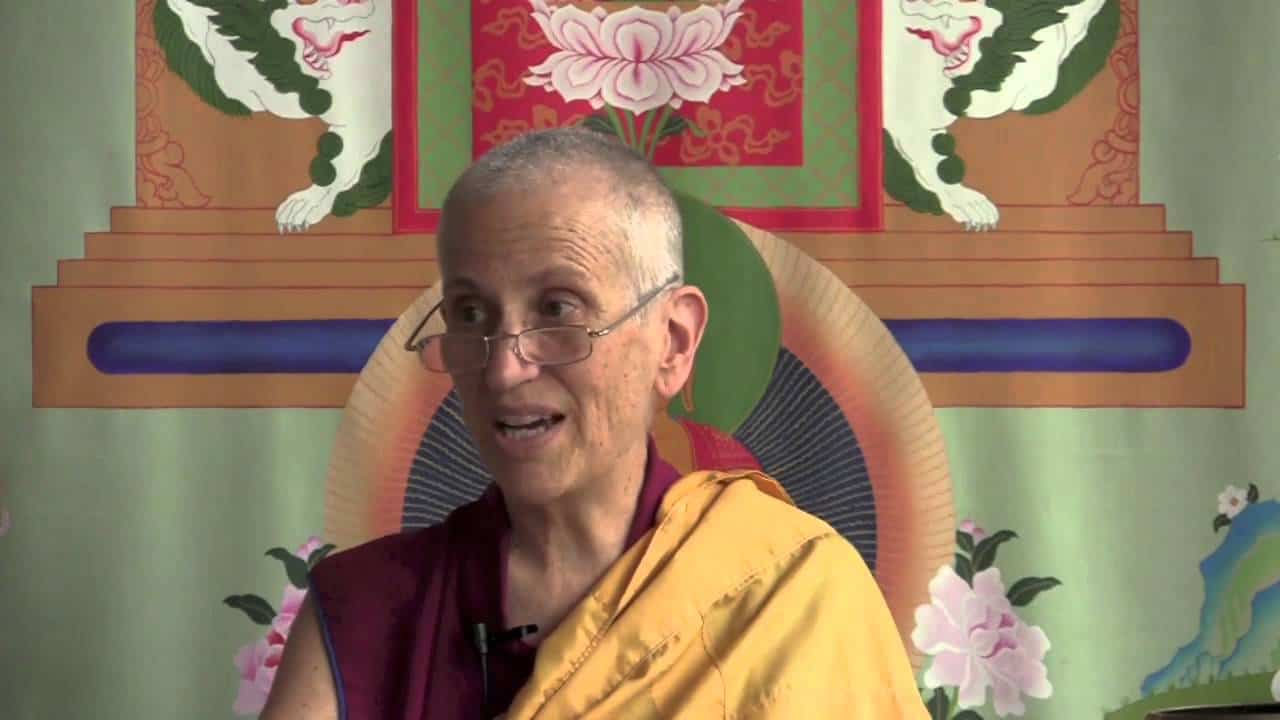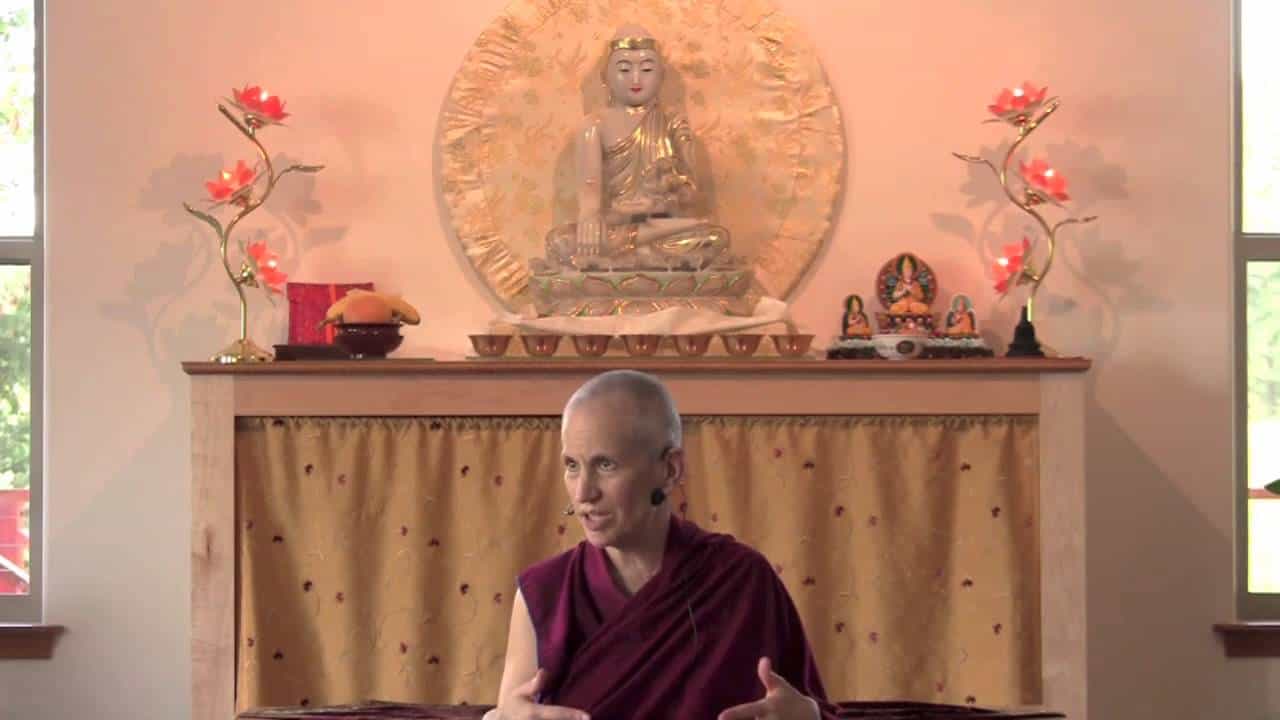Verse 100: The armor of fortitude
Part of a series of talks on Gems of Wisdom, a poem by the Seventh Dalai Lama.
- Nowhere in samsara we can go where people won’t criticize or disagree with us
- Letting go of “poor me”
- Physical and mental pain are part of having a body and mind under control of afflictions and karma
- Patience with the difficulties encountered in Dharma practice
Gems of Wisdom: Verse 100 (download)
What armor is never pierced by any type of weapon?
Fortitude in the face of challenges arising from insults and attacks.
As we did last week in “Easy Path,” we talked about three types of fortitude.
-
The fortitude of bearing just suffering in general, like when we get sick, mental and physical suffering.
-
And the second, the fortitude of bearing insults and attacks, when people harm us, especially criticism and so forth.
-
And then the fortitude of engaging in our spiritual practice, and the difficulties that can come up when we’re doing a spiritual practice.
So the first type of fortitude, insults and attacks, we’ve got to practice this because there is nowhere in samsara we’re going to go where somebody is not going to criticize us. This is the first thing we need to get through our thick skulls. At least I needed to get through my thick skull. Because one of my first rules of the universe is “nobody should criticize me.” But where am I going to go where nobody is going to criticize me? Only full awakening. Aside from that, maybe the pure lands. But depends what kind of beings are in those, there’s different kinds of pure lands. Even you go to Amitabha Buddha’s pure land, if you’re messing off he’s certainly going to say something. You think Amitabha’s going to let you mess off and sleep all day? Forget it.
There’s no place to go where people are not going to notice our mistakes and comment on them, so we’d better get used to that and learn to accept these kinds of things instead of taking everything personally. Instead of it causing this incredible doubt in our minds about “Am I worthwhile? Do people like me? Do I belong?” You know? All this kind of stuff that gets activated simply by sound waves going through the air that we interpret and then make up into the most amazing kind of stories that all revolve around how bad we are. Or if they aren’t about how bad we are, they’re about how bad the other person is because they’re commenting about how bad we are.
We’ve kind of had this problem since beginningless lifetimes. We’ve been pretty miserable with it since beginningless lifetimes. So now we actually have the chance and the choice to do something about it. If we don’t do something about it then we’re going to perpetually be like the big button that sticks out halfway into the corridor that says “don’t push me” that gets activated even by the breeze, you know? And we’ll continue to get mad at every small thing because we think everything relates to ME. What everybody else does in their lives relates to me because I’m definitely the center of the universe. So if they have a certain look on their face it’s because of me. If they don’t eat cabbage at lunch it’s because of me. If they’re late for meditation it’s because of me. If their eyeliner isn’t right it’s because of me. Everything relates to me.
Boring. Come on, we’ve got to grow up from this. It’s really too boring to go through life and think that every small thing that happens is due to ourselves and it’s because people don’t appreciate us, they don’t love us, they don’t understand us, they don’t accept us, they’re rude to us, they’re mean to us, they forget about us, everything horrible happens to me [sobs].
You know, we’ve been doing this since beginningless time. Isn’t it boring already? No, we still get off on it, don’t we? We still: “Oh wow, it means I exist! If people hate me it means I exist!” So you can really see how important the view of the personal identity is, because even if we’re miserable it means I exist, there’s a real “me” to grasp onto. [sighs]
You know, it really is boring after a while.
Okay, so, fortitude in the face of that. Fortitude in the face, again, of physical and mental suffering. Again, it’s been going on since beginningless time. “My little toe on my right foot, my middle toe on my left foot hurts, my big toe on my right foot hurts the…” Do you have a ring finger toe? [laughter] “My fourth toe hurts, my second toe hurts…. Everything hurts…. This little thing hurts, this little thing hurts….” You know? Always something hurts.
Well, congratulations, we have a body that is the result of afflictions and karma. Did we get a contract with that body that said you will never experience pain? No, that kind of contract did not come with that body. So the kind of body we have, it’s going to break down. It’s going to get sick. It’s going to be painful. What else is new? We can either cry about it or we can transform it into the path and see it as a ripening of our negative karma, as something that’s going to increase our renunciation and determination to attain liberation, to increase our compassion for other sentient beings. There are so many Dharma possibilities with how to deal with pain. So we can either complain and feel sorry for ourselves, be mad at the world, or we can practice the Dharma. It’s our choice.
And if you don’t like the choice I can’t refer you to a complaint department because there’s no complaint department aside from our own ignorance. So if you don’t like the choices complain to your own ignorance.
Then there’s the difficulties of practicing the Dharma. Like you come to the Abbey (we were talking about this yesterday). You come to the Abbey and everything is going to be great! And Dharma’s great. And the community’s great. And when you’re here for a week or two weeks it’s great. And then afterwards what happens? “Oh god, look at my mind.” It’s the same old mind.
Well it’s not, it’s changed, but we don’t see it that way. It’s like, [sigh] “Oh, do I have to sit down for another meditation? Really?” It’s like “I need a break from this.” “Just give me a break from samsara so I can relax for a while and then I’ll come back and practice.”
I don’t know where that break from samsara where you’re going to find that. Maybe you can complain to the department of ignorance about that one, too.
But the difficulties of dealing with a mind that is under the influence of afflictions and karma and goes bananas. The difficulties of trying to understand different Dharma points where you can look at the paragraph this way, and you can turn it upside-down and it means exactly the same thing to you, because it’s really hard and the meaning is not clear to us. Or practicing the Dharma and you think you understand it until somebody asks you a question and then you’re going “mmmm, I don’t know the answer….” And the difficulties of practicing the Dharma when you hear me give a Dharma talk like this instead of “poor you, I know somebody insults you and that’s really too bad, this kind of fortitude, you try practicing it but it’s really the other person’s fault.” That’s what you want to hear. But that’s not what your teacher says. So that’s part of the difficulty of practicing the Dharma. Because when you go to your teacher you want your teacher {to say) ” poor you, it’s really difficult, I know, samsara’s tough on you, harder on you than on anybody else, poor you. Don’t compare yourself to the people off the coast of Thailand who have just been sent further out to sea after the Thai government fixed their engines and gave them a little bit of water and food. But refuse to let them in. And no other country is letting them in. So don’t compare yourself to those people. Just feel sorry for yourself right now…..”
So yes, there are difficulties to practicing Dharma. But the beautiful thing is the Buddha taught how to practice fortitude in terms of all these difficulties, and there are definite methods to practice, and we’ve got to not only learn the methods but practice them. Think about them in terms of real life situations that we experience. Not just in terms of abstract something something, but in terms of really what happens to us.
Venerable Thubten Chodron
Venerable Chodron emphasizes the practical application of Buddha’s teachings in our daily lives and is especially skilled at explaining them in ways easily understood and practiced by Westerners. She is well known for her warm, humorous, and lucid teachings. She was ordained as a Buddhist nun in 1977 by Kyabje Ling Rinpoche in Dharamsala, India, and in 1986 she received bhikshuni (full) ordination in Taiwan. Read her full bio.


